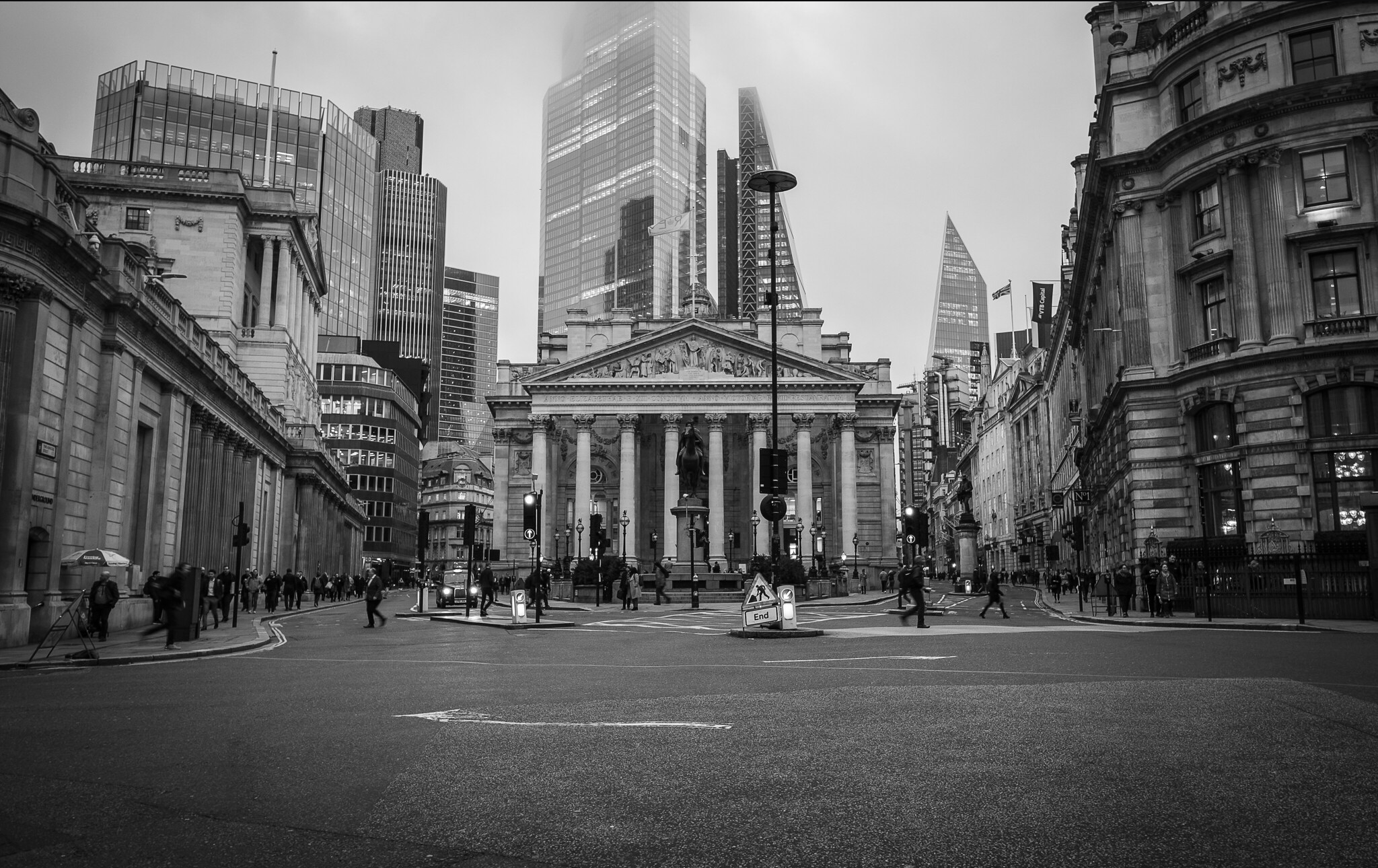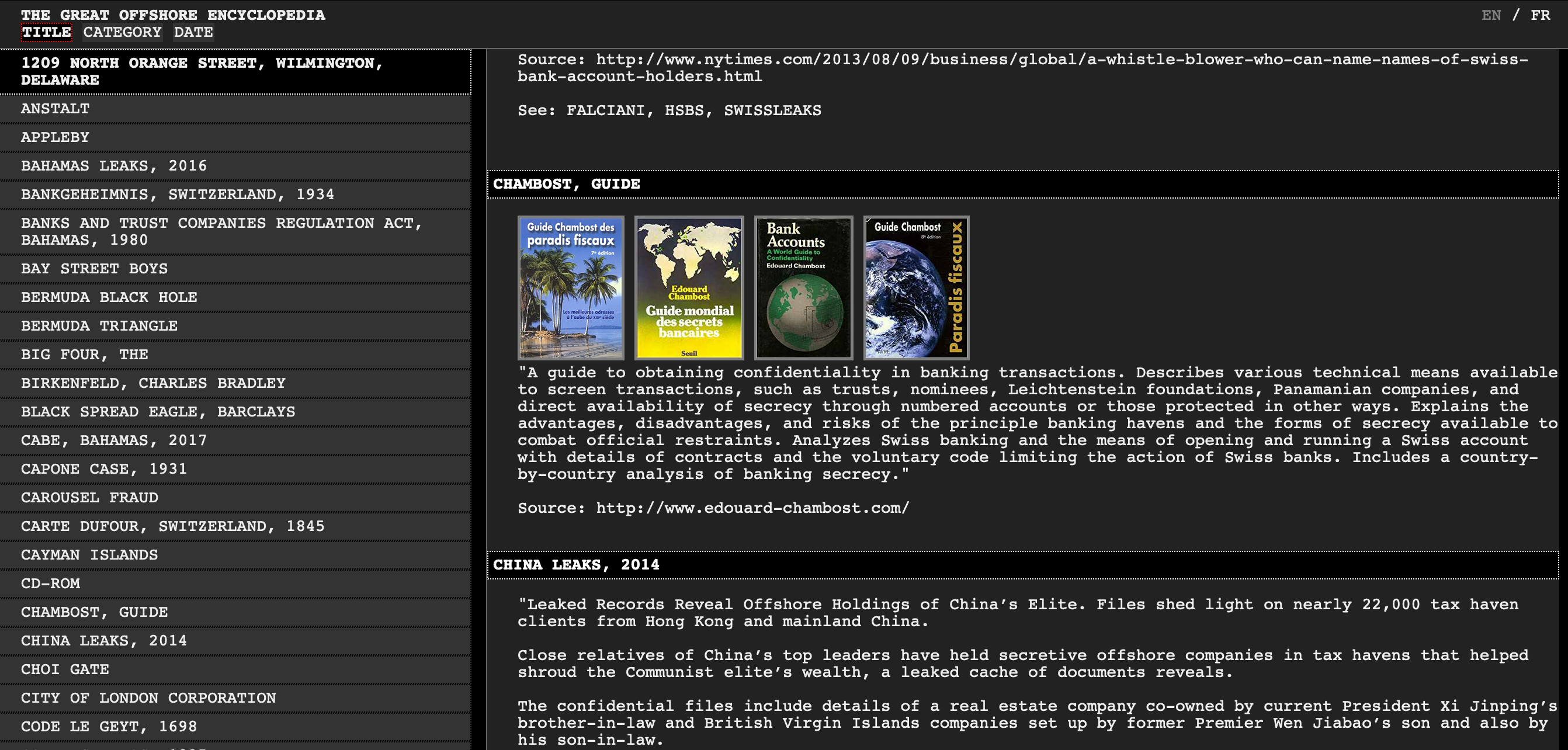This interview was first published here.
Introduction by Max Gorynski. Interview by Nika Mahnič.

A data visualisation of all of the nations implicated in the offshoring accounts disclosed by the Panama Papers, and their relations to one another.
From Panama to Paradise to the Bahamas and back, touching upon everywhere between in heaven and in hell (yes, even Delaware), there are few shores around the world that have yet to, in some way, be made an offshore.
It’s an idea that has come to gain considerable weight in the public imagination in the last decade, financial offshoring. The phenomenon is a fundamental bell-weather of increasing globalization. As global markets open up more and more, year-on-year, more businesses are choosing to relocate aspects of their operations, including accounting, to other, more permissive regions of the world.
Offshoring is not, of course, simply a question of canny business strategy. The Mossack-Fonseca affair in 2016 brought the illegal utilities of offshoring — which begin with simple fraud and proceed through tax evasion, international sanction avoidance, corruption, and worse — to wide attention. The unethical dimensions of the practice of offshoring have been subject to intense scrutiny not only by cadres of journalists and academics, but by the public at large as well, at least in the West. This is true particularly since large swathes of ordinary taxpayers, who’ve seen domestic job volume dwindle as more and more businesses base their operations abroad, have woken up to the cost it incurs for them personally.
One outfit devoted to assessing the means by which offshoring and other methods for financial gain are practiced, is the artist collective RYBN. Theirs is an effort driven by both data-oriented investigation, and by art.
Wonk Bridge’s Nika Mahnič spoke to them after their participation at the 8th edition of MoneyLab conference, where RYBN spoke about their work as part of Tax Havens: Normalized Grand Theft panel. You can check out the complete recording of that address here. In this interview, they delve into the their background as an organisation; their achievements in databasing; the golden passport phenomenon; and why offshoring was and remains a powerful tool of colonial and very much illiberal dispositions.
Tell us a little bit about your respective backgrounds, what drew you into your specific research and art projects?
RYBN.ORG is an artist collective formed in 1999. Our primary center of interest was related to internet as a medium of artistic expression and as a medium for research — from here comes our growing curiosity for cybernetics, data mining and algorithms. The economy and the [global] financial system, in their contemporary manifestations, offer a privileged vantage point from which to understand the transformations brought about by cybernetics, as well as a stage for artistic interventions.
Over the last two decades, we have conducted extensive research on niche topics related to the cyberneticized economy : we have investigated and documented the esoteric mechanisms of High-Frequency Trading and the Sub-second Market Microstructure, the “flash crashes” that give rhythm to financial exchanges. With the project “Data Ghosts”, we tried to uncover the eschatological nature of cybernetics, through its relationship to Kabbalah. Our latest investigation, “Human computers”, explores the relationships between computing and the division of Labor, and the mutations of work conditions within the digital labor regime.
With an intimate understanding of the financial ecosystem, and a keen interest for hidden signs and esoteric knowledge, we naturally expanded our investigations towards the offshore opaque territories.
Your Offshore Tour Operator is a situationist GPS prototype, orientated toward a computer assisted psychogeographic drift. It dictates the walk of the user through the ICIJ Offshore Leaks database addresses — including the Offshore Leaks, the Bahamas Leaks, the Panama Papers, the Paradise Papers. In other words, it shows us how channels of offshoring exist all around us.
How do you approach the curation of this database?
The Offshore Tour Operator aims to reveal the ubiquity and the proximity of the offshore industry; [it is all around us, despite] usually being seen as abstract and distant, off-ground. Each of the 785,000 addresses of the ICIJ Offshore Leaks database has been geolocalized on a map. The Offshore Tour Operator superimposes this 1/1 scale map to the streets, as a second layer of reality, as an echo to the proposition of Vera Tollmann and Boaz Levin in their text “The City and its Double”. The application drives you in your daily life environment, through familiar streets, and reveals this ‘second layer of reality’ where offshoring mecnahism can be found.

A screenshot from RYBN’s “Offshore Tour Operator” application, active for a region in Singapore. All dots represent locations implicated in offshoring activities, according to information from ICIJ Offshore Leaks database. — Some text in French —
We didn’t conduct any curation over the ICIJ database, just a simple geolocalization of every single entry. We haven’t hierarchized the entries relatively to their importance of the role they play in the network architecture, or [with respect to ] beneficiaries. Most of them are not even major agents, just the many “little hands” of the offshore system, which could not exist without them. Furthermore, the Offshore Leaks database itself is both partial and obsolete by nature, so the Offshore Tour Operator is also representative of this gap of information. Sometimes, the dérive through the city brings you to addresses that are not valid anymore, as their publication incited the unveiled agents to move. In this regard, the Offshore Tour is a hunt for ‘ghosts’, for traces.
However, we do not approach those data as neutral. The dérives are the trigger for discussions on the abstraction of finance as well as on the partiality and the obsolescence of data, the necessity of analysis and perspectives. The participants curate themselves the data, try to identify for the missing parts, transform themselves into investigators, etc… Offshore Tours are an invitation to discuss collectively the reality of offshore beyond data, outside the maps and discuss its concreteness in the architecture, as well as in its consequences on state budgets and public services.
Given there was a clampdown on Swiss banking owing to its being ‘over-liberal’ in allowances (leading to Singapore filling that void), do you see any likelihood that there will be organised action against the banks (UBS, Credit Suisse etc.) that enable offshoring, given that so many notable actors benefit from them?
The Swiss Banking sector has been forced to regulate itself as a result of its commercial war states with the United States for the domination of the lucrative Wealth Management sector[1]. As a result, the US has probably become the world tax haven leader, though its proxies, the deregulated states of Wyoming and Delaware. While Switzerland had to restructure its Wealth Management sector over the art market and the freeports, and outsource its domiciliation services — shell corporations are now created by the BVI, Singapore, etc.
We addressed this issue at the occasion of Basel’s LISTE Art Fair where we perfected a speculative model that summarizes offshoring through art, taking advantage of the expert audience to refine the model.
Despite new international regulations, changes are essentially cosmetic, not structural. Switzerland has come out of this conflict partly laundered, and its Wealth Management services though art is fully legitimized and normalized. Offshore banking is a concomitant practice to wealth accumulation, a sea snake that changes form and adapts, exploits regulations. This normalisation process of the offshore banking works in a double dynamic : nation-states deregulate more and more to compete with the traditional tax havens (usually set as their own proxies), while offshore practices tend to transfrom in order to reinvent themselves in a pseudo-legal form. A double race to the bottom.
How do you perceive potentially nefarious political influences being subsidised through offshored wealth (i.e. Peter Thiel and his interests etc.)?
The deeper we went with the investigation, and more some important public figures began to appear. Among them, Robert Mercer, Peter Diamondis, Jeff Bezos, Peter Thiel, Elon Musk, Donald Trump, etc… They are the architects, the beneficiaires and the promoters of this normalisation process. The names and the public figures are not so important here, as they represent a class system, the class of neo-illiberalism[2].
The neo-illiberal system is not based anymore on the old offshore, with its shadow circuits and invisible operations. The new offshore works as a normalized system, legitimized by the economic “necessity” of optimization. These mediatic figures are the biggest promoters of this new version of offshore, built on the ruins of the international regulations that they assault constantly with their lobbying operations. An offshore that is normalized in the mainstream discourse and politically proactive, that assumes without shame its feudal vision of society— Ayn Rand is the bible ; an offshore that is outrageous in its feeling of immunity and legitimacy ; an offshore that bears a kitsch flavour in the vision of the future they do promote ; an offshore whose social politics is philantropy (another offshore circuits) and “trickle-down”, while their entreprises and politics aggravates the precarity of societies.
Could you tell us more about your last project about golden passports?
The Golden Passports programs, also known as CBI (Citizenship By Investment programs) are one of these normalisation markers of offshore, understood here as a service for the super wealthy. Developped primarily in St Kitts and Nevis, CBI has grown as a normalized service within europe in Cyprus and Malta, even if its is framed by heavier regulations in many other countries. The novelty of these CBI programs are the crudeness of the selling of nationalities at the era of migrations, walls erections and refugees refusal, camps such as Moria, and facist milices that comes to shoot the refugees. These programs emphasizes the ongoing class struggle.
For now, CBI is one of the speculative topics we explore in the next step of the project, a forthcoming publication with UV Editions. Within this publication, CBI is associated to other case studies : asteroid mining and space extractivism programs (the so-called new space), Virtual Financial Assets programs (the recycling by institutional banks of the crypto-currencies), the sea steading programs, and the freeports. These five phenomena are exemplar at different levels on the normalisation of offshore. The book brings together all those epiphenomena into a larger perpective of Offshore, taken as a goverance model. The book includes texts and contributions from James Bridle, Ewen Chardronnet, Max Haiven, Brian Holmes, Aude Launay, Rachel O’Dwyer, Brett Scott, Vera Tollmann & Boaz Levin, Reijer Peter Hendrikse and Rodrigo Fernandez, and many more.
In your Offshore Encyclopedia you include local mythologies, ghost stories and piratology. Could you tell us more about the project and the importance of including other narrative positions?
The Offshore Encyclopedia is a collection of singular stories, narratives, and folklores we have collected during our field investigations in the most remarkable offshore locations[3]. We remained very open in the process of accumulation and aggregation : ghosts, witch-hunt, rituals, colonialism, slave ships insurance, marronnage, republic of pirates, topographic maps, calculating machines, sponges culture, plantationocene, mass-tourism, casinos, free ports, omerta, mailboxes, logos, heraldic, etc. resulting in unusual semiotic associations. With this collection, we try to break up with the mainstream narrative of the offshore economy, which frames the phenomenon as marginal and isolable.
The Encyclopedia is an attempt to recontextualize the offshore into a global approach, to open new perspectives, recreate or reveal neglected historical correlations. Borrowing a concept to Donna Harraway, we could see it as an operation to thicken the present[4] — or as a way to give the investigation a multiperspectivist touch[5]. The offshore phenomenon needs to be understood as systemic. For this aim, Harraway’s speculative narrative technique can help by establishing a network of relations between disparate elements. As an example among many, Canary Wharf, a big financial center located at the East of London where every big banks and “offshore magic circle” agencies are concentrated, has been built on the ruins of an important harbor of the colonial British Empire, the West India Docks. This land was also called Isle of dogs.
By multiplying those kind of correlations, we can underline how the historical development of offshore capitalism is rooted to colonialism.
With statues of slave owners being thrown in the sea, is it a time ripe for protests against offshore?
Offshore is a political problem, not a technical one. It is a political instrument to perpetuate relationships based on dominance. Offshore is about how to blur and break links between entities and their responsibilities, whether regarding criminal sources of profit (laundering), or how those profits can be socially redistributed through taxes (tax evasion and optimisation) — and by extension debts and bankruptcy. But it serves as well to outsource bad work conditions, in terms of salary and security, ecological impacts on the environment (with, for example, the flags of convenience specialized for boats to be dismanteled, the “pavillons corbillards”, as in Palau). As summarized in the French expression “se dédouaner de ses responsabilités” (clear oneself of responsibility), offshore provides clean and responsible images for companies and brands, through very efficient tools and adaptive governances.
The offshore industry appears fundamentally as a question of image, and provides a kind of public consent by default, a defensive wall to critics and transparency requests, adjusted to what is generally admitted as acceptable or scandalous. So, our suggestion: let’s move the lines of what is acceptable.
Nicholas Shaxson and Alain Deneault[6] both wrote on the intricate relations between colonialism and the offshore industry, in terms of historical roots, geographic and geopolitical overlapping. Offshore banking is the perpetuation of the colonial regime, renewed into a system of proxy politics[7]. We need to apply the decolonial critical tools to offshore.
[1] All started with informations from within, leaked by a whistleblower. Pierre Gastineau and Philippe Vasset have drawn attention over the geopolitical use of the leaks. While some important leaks may never reach a public conclusion, or a trial, or while some whistleblowers remains incarcerated or in exile, others are rewarded by states. Bradley Birkenfeld was awarded 104 millions dollars in 2012 for its cooperation with the IRS services. Edward Snowden is still in exile, Julian Assange awaits its extradition trials. See: Pierre Gastineau, Phillipe Vasset, Armes de déstabilisation massive, 2017.
[2] To quote Reijer Hendrikse (2020), “Neoliberalism is over — welcome to the era of neo-illiberalism.”
[3] incl. The City of London, Dublin, Jersey, Guernsey, Switzerland, Liechtenstein, Delware, the Bahamas, the Caymans, Malta, Luxembourg, The Netherlands.
[4] Donna Harraway, Staying with the Trouble: Making kin in the Chthulucene, 2016
[5] Eduardo Viveiros de Castro, Métaphysiques cannibales, 2010
[6] Alain Deneault, “Paradis fiscaux, la filière canadienne, Ecosociété, 2014.
[7] See also: Reier Hendrikse et Rodrigo Fernandez article, that describes the indonesian independance as a negociation to perpetuate the Netherlands economical domination after independance. In “Offshore Finance: How Capital Rules the World”, January 2019 https://www.researchgate.net/publication/330713868_Offshore_Finance_How_Capital_Rules_the_World




